I have not posted for the last few weeks, not because I have nothing to say but rather because I have been thinking about the future of this blog. I have had in mind for some time that there is a need to say something about the Bayesian analysis facilities that were introduced in Stata14 and while preparing […]
Bayesian Analysis with Stata
Banning p-values
If you were to look back at my previous postings on this blog, you would find that I am often motivated by topics that arise from teaching on our Masters course in Medical Statistics. Well, a new cohort of students started recently and in the first couple of weeks we give them an overview of basic statistics to make sure […]
Reversible Jump MCMC III
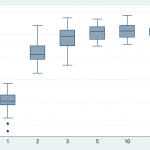
In the previous posting in this series on RJMCMC, I created a Stata program for the following problem. We have two binomial samples y1=8, n1=20 and y2=16, n2=30, but we are not sure whether to model them as, M1: binomials with different probabilities π1 and π2 M2: binomials with a common probability ξ. For my […]
Reversible Jump MCMC II
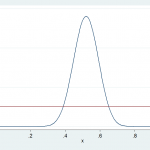
Last time I outlined the derivation of a Metropolis-Hastings algorithm for RJMCMC and this time I want to implement it in Stata for a very simple problem. I have taken the problem from the paper in The American Statistician by Barker and Link that I referenced at the end of my last posting. We have two binomial […]
Reversible Jump MCMC
I want to introduce RJMCMC and demonstrate how it can be programmed in Stata. To understand this algorithm, you really do need to know a little about the basis of Metropolis-Hastings, so this week I will run through the ideas behind the equations. A bit of algebra I am afraid, but once it is out […]
Webinar: Frequentist accuracy of Bayesian estimates
A few weeks ago I wrote a posting about an article by Bradley Efron on the frequentist accuracy of Bayesian estimates and last week a message circulated on Allstat to say that the RSS is to offer a webinar (horrid word) on 21st October in which Bradley Efron will present this same paper. Since it […]
Back to Google Flu Trends
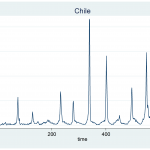
It has been rather a long gap since my last posting but I am told that the re-direction virus has been cleared from the host’s server so I am going to return to the topic of fitting Bayesian models to flu epidemics using the Google Flu Trends data (https://en.wikipedia.org/wiki/Google_Flu_Trends). Google’s project created estimates of the number of cases of […]
Hijack
If you can read this then you are one of the lucky, perhaps unlucky, ones. This blog is hosted by a commercial company and it has been reported to me that a redirection virus has got into the system. I tried reading my own blog this week and got redirected to a porn site. Ironic […]
Google Flu Trends Part II
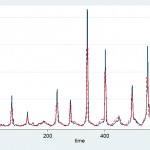
Last week I discussed Google Flu Trends a project that provided weekly estimates of the number of flu cases in 25 different countries based on the frequency of internet searches for influenza related terms (https://en.wikipedia.org/wiki/Google_Flu_Trends). Sadly Google have stopped producing these estimates but historical data are still available for download. Presumably Google gave up when faced with […]
Google Flu Trends
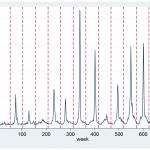
I am always on the lookout for interesting medical data sets that I can use for teaching and the other day, quite by accident, I came across “Google flu trends”. This is an internet project operated by Google that estimates the numbers of cases of influenza each week in 25 different countries. The records go back to […]


Recent Comments